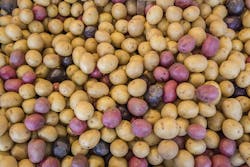Scientists in China have developed a method of making fertilizer from potato effluent — the wastewater discharged by potato processing plants, the state-run Xinhua News Agency reported this week.
China is the world’s largest potato producer and sees the crop as a new staple food to help ensure food security. But the industry has a pollution problem: Protein-rich water discharged by starch processors, a major buyer of the country’s potatoes, has been blamed for polluting rivers and lakes.
“For years, there has been no technical solution to this problem, forcing environmental authorities to close more than 10,000 small plants, which has hurt the potato market and farmers,” said Liu Gang, researcher with the Chinese Academy of Sciences, Lanzhou institute of chemical physics.
According to Xinhua, technology developed by Liu’s team can halve the chemical oxygen demand (COD) of the potato effluent by removing starch, fiber and protein. The processed water that remains is high in nitrogen, potassium and phosphorus, making it ideal for irrigation purposes.
A four-year trial has shown that the water is harmless to crops, and three starch companies are now using the technology to purify their wastewater discharge, the news agency said.
Potato starch is used by food processing companies in China to make buns, noodles and other products that are familiar to Chinese consumers.
